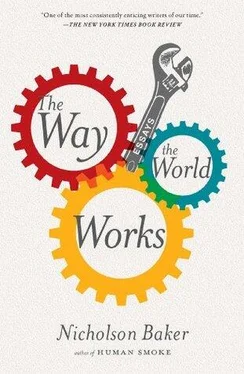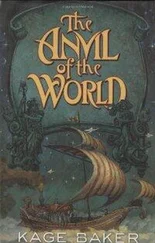The plug, which was combined with the USB connector, was extremely well designed, in the best post-Apple style. It was a very, very good plug. I turned the Kindle on and pressed the Home key. Home gives you the list of what you’ve got in your Kindle. There were some books that I’d already ordered waiting for me — that was nice — and there was also a letter of greeting from Jeff Bezos. “Kindle is an entirely new type of device, and we’re excited to have you as an early customer!” Bezos wrote. I read the letter and some of His Majesty’s Dragon (a dragon fantasy by Naomi Novick set during the Napoleonic Wars, given away free), Gulliver’s Travels, and Slow Hands, a freebie Harlequin Blaze novel by Leslie Kelly. I changed the type size. I searched for a text string. I tussled with a sense of anticlimax.
The problem was not that the screen was in black-and-white; if it had really been black-and-white, that would have been fine. The problem was that the screen was gray. And it wasn’t just gray; it was a greenish, sickly gray. A postmortem gray. The resizable typeface, Monotype Caecilia, appeared as a darker gray. Dark gray on paler greenish gray was the palette of the Amazon Kindle.
This was what they were calling e-paper? This four-by-five window onto an overcast afternoon? Where was paper white, or paper cream? Forget RGB or CMYK. Where were sharp black letters laid out like lacquered chopsticks on a clean tablecloth?
I showed it to my wife. “Too bad it doesn’t have a little kickstand,” she said. “You could prop it up like a dresser mirror and read while you eat.” My son clicked around in the Kindle edition of a Bernard Cornwell novel about ancient Britain. “It’s not that bad,” he said. “The map looks pretty good. Some of the littler names aren’t readable. I’d rather be reading that”—pointing to his Cornwell paperback, which was lying facedown nearby—“but I can definitely read this.”
Yes, you can definitely read things on the Kindle. And I did. Bits of things at first. I read some of De Quincey’s Confessions , some of Robert Benchley’s Love Conquers All, and some of several versions of Kipling’s The Jungle Book . I squeezed no new joy from these great books, though. The Gluyas Williams drawings were gone from the Benchley, and even the wasp passage in Do Insects Think? just wasn’t the same in Kindle gray. I did an experiment. I found the Common Reader reprint edition of Love Conquers All and read the very same wasp passage. I laughed: ha-ha. Then I went back to the Kindle 2 and read the wasp passage again. No laugh. Of course, by then I’d read the passage three times, and it wasn’t that funny anymore. But the point is that it wasn’t funny the first time I came to it, when it was enscreened on the Kindle. Monotype Caecilia was grim and Calvinist; it had a way of reducing everything to arbitrary heaps of words.
Reading some of Max, a James Patterson novel, I experimented with the text-to-speech feature. The robo-reader had a polite, halting, Middle European intonation, like Tom Hanks in The Terminal, and it was sometimes confused by periods. Once it thought miss. was the abbreviation of a state name: “He loved the chase, the hunt, the split-second intersection of luck and skill that allowed him to exercise his perfection, his inability to Mississippi.” I turned the machine off.
And yet, you know, many people loved it. To be fair to the Kindle, I had to make it through at least one whole book. Jeff Bezos calls this “long form” reading. I had some success one morning when I Kindled my way deep into The Complete Idiot’s Guide to Writing Erotic Romance, by Alison Kent. There are, I learned, four distinct levels of intensity in the erotic-romance industry: sweet, steamy, sizzling, and scorching. This seemed like pertinent information, since romance readers are major Kindlers. “The success of the ebook is being fueled by the romance and erotic romance market,” Peter Smith, of ITworld, reports. Smith cites the actress and Kindle enthusiast Felicia Day, of Buffy the Vampire Slayer, who has been bingeing on paranormals like Dark Needs at Night’s Edge . “I’ve read like, 6 books this week and ordered about 10 more,” Day blogged. “It’s stuff I never would have checked out at the Barnes and Noble, because the gleaming and oily man chests would have made me blush too much.”
But e-romances don’t fully explain the Kindle’s success — and the kind of devotion that it inspires. To find out more, I went to Freeport, Maine, to talk to Eileen Messina, the manager of the British-imports store just across from L.L. Bean. Messina, a thoughtful, intelligent woman in her thirties, has all kinds of things on her Kindle, including Anna Karenina, Murakami’s Kafka on the Shore, books by Dan Simmons and Abraham Verghese, and the comic novel Pride and Prejudice and Zombies . She is so happy with it that she has volunteered, along with about a hundred others, to show it off to prospective purchasers, as part of Amazon’s “See a Kindle in Your City” promotion. Her Kindle was in her purse; she’d crocheted a cover for it out of green yarn. In the past, she said, she’d taken books out of the library, but some of them smelled of smoke — a Kindle book is a smoke-free environment. I thanked her and bought some digestive biscuits and a teapot, and then I went next door to Sherman’s Books and Stationery. I asked Josh Christie, who worked there, to recommend a truly gut-churningly suspenseful novel. I was going to do a comparison between the paperback and the Kindle 2 version. Christie suggested The Bourne Identity and a book by Michael Connelly, The Lincoln Lawyer —one of his colleagues at the shop swore by it. I bought them both.
Outside, I sat on a bench near L.L. Bean, eating an ice cream, and tried to order The Bourne Identity wirelessly from the Kindle Store. But no — there is no Kindle version of The Bourne Identity . What?
What else was missing? Back home, I spent an hour standing in front of some fiction bookcases, checking on titles. There is no Amazon Kindle version of The Jewel in the Crown . There’s no Kindle of Jean Stafford, no Vladimir Nabokov, no Flaubert’s Parrot, no Remains of the Day , no Perfume by Patrick Suskind, no Bharati Mukherjee, no Margaret Drabble, no Graham Greene except a radio script, no David Leavitt, no Bobbie Ann Mason’s In Country, no Pynchon, no Tim O’Brien, no Swimming-Pool Library, no Barbara Pym, no Saul Bellow, no Frederick Exley, no World According to Garp, no Catch-22, no Breakfast at Tiffany’s, no Portnoy’s Complaint, no Henry and Clara, no Lorrie Moore, no Edwin Mullhouse, no Clockwork Orange .
Of course, the title count will grow. It will grow because not-so-subtle forces will be exerted on publishers and writers. Below the descriptions of all non-Kindle books for sale on Amazon, there’s a box that says, “Tell the Publisher! I’d like to read this book on Kindle.” If you click it, Amazon displays a thank-you page: “We will pass your specific request on to the publisher.”
But say you’ve actually found the book you’re seeking at the Kindle Store. You buy it. Do you get what’s described in the catalog copy? Yes and no. You get the words, yes, and sometimes pictures, after a fashion. Photographs, charts, diagrams, foreign characters, and tables don’t fare so well on the little gray screen. Page numbers are gone, so indexes sometimes don’t work. Trailing endnotes are difficult to manage. If you want to quote from a book you’ve bought, you have to quote by location range — e.g., the phrase “She was on the verge of the mother of all orgasms” is to be found at location range 1596–1605 in Mari Carr’s erotic romance novel Tequila Truth .
Читать дальше












